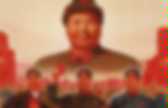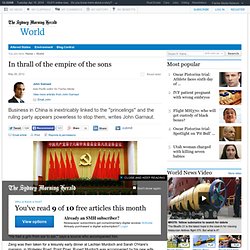

Party Like It's 1989 - By Perry Link. In 1989 Deng Xiaoping, then China's paramount leader, made a long-term calculation that is now receiving its most severe test.

Deng knew that China's authoritarian power structure, in which officials at each level are beholden to the people above, had one glaring weak point. In China, Fear at the Top. In thrall of the empire of the sons. Blood ties ...

Some of China’s most respected public intellectuals are warning that Chinese society and the economy are being held hostage to the wealth-maximising requirements of the political elite. Photo: AP When the kingmaker of Chinese politics, Zeng Qinghong, asked to see quintessential Australia, his diplomatic minders treated him first to jugs of beer and an oversized fillet steak at Brisbane's Breakfast Creek Hotel. Next stop was Sydney, where he dropped into Rupert Murdoch's Fox studios and was introduced to Nicole Kidman and Ewan McGregor on the set of Moulin Rouge. ''He had a grin from ear to ear,'' says a source who accompanied him. Zeng was then taken for a leisurely early dinner at Lachlan Murdoch and Sarah O'Hare's mansion, in Wolseley Road, Point Piper.
Zeng had clearly enjoyed taking off his tie, rolling up his sleeves, and bantering with the punters at the Brekky Creek, but he was even more impressed with the Murdochs' stunning harbour views. "China’s Political Storm" by Brahma Chellaney. Exit from comment view mode.

Click to hide this space NEW DELHI – As senior leaders are purged and retired provincial officials publicly call for Politburo members to be removed, it has become clear that China is at a crossroads. China's 'Princelings' Pose Issue for Party. Reform in the Air in Beijing. At the moment, the Communist Party elite is gathered in Beijing for the annual meeting of the National People’s Congress.

China’s Constitution makes the NPC, as it is known, the supreme organ of state power, but everyone views it as just the “rubber stamp” that it in fact is. This year, however, the massive gathering has taken on significance because it is considered the “warm-up” for the 18th Communist Party Congress. The Party Congress, to be held sometime this fall, will set China’s direction for the next decade. At the event, the party will, among other things, select a new Central Committee, the body that presides over the organization between congresses. And then things really get interesting.
"The Paradox of China’s Reform" by Jamie F. Metzl. Exit from comment view mode.

Click to hide this space NEW YORK – The compelling drama of former Chongqing Communist Party chief Bo Xilai’s ouster amid allegations of corruption and murder, and of blind Chinese human-rights advocate Chen Guangcheng’s dash to safety in the US Embassy in Beijing, are more than just fascinating narratives of venality and courage. Unless China can purge the thousands of corrupt Party leaders like Bo, and empower people – like those Chen represents – who have been left behind or harmed by rapid growth, its economy will increasingly suffer. What's going on in Xinjiang. Will China hold together?

I'd say yes. Chinese coup watching. Last week, controversial politician Bo Xilai, whose relatively open campaigning for a seat on China's top ruling council shocked China watchers (and possibly his elite peers, as well), was removed from his post as Chongqing's party secretary.

He hasn't been seen since. Rumors of a coup, possibly coordinated by Bo's apparent ally Zhou Yongkang, are in the air. Western media has extensively covered the political turmoil: Bloomberg reported on how coup rumors helped spark a jump in credit-default swaps for Chinese government bonds; the Wall Street Journal opinion page called Chinese leadership transitions an "invitation, sooner or later, for tanks in the streets. " Still the People’s Republic of Rumors.
As my FP colleague Isaac Stone Fish, Bloomberg View's Adam Minter, and others have very ably documented, China's microblogs have been buzzing all week with rumors - unsubstantiated -- of a political coup in Beijing.

(Were those gunshots you heard? Oh, just fireworks, as per the usual in Beijing.) Ironically, this latest eruption of China's online rumor mill has happened shortly after the government's plans to enforce real-name registration and other controls on Weibo -- the most-prominent Twitter-like microblog -- went into effect. The Insider - By Kerry Brown. There is a joke in China that the Communist Party actually doesn't mind elections, as long as it knows the outcome in advance.

So though the stately, plump Vice President Xi Jinping still needs to officially stand for the position of general secretary to replace President Hu Jintao in October, the result -- barring disaster -- seems pretty certain. For Xi, a former pig farmer and provincial leader, and the scion of one of the reddest families in China, the last five years have been a campaign with Chinese characteristics to ensure that when he steps out behind the red curtain at the Great Hall of the People in six months' time, the last thing on anyone's mind will be a sense of surprise. Xi, the son of a former vice premier, with an easy smile and the paternalistic manner of a well-seasoned Chinese leader, seemed destined to rise to the top. But it wasn't always clear that he would rise this far. Xi has also succeeded in avoiding knotty issues like health-care reform and social unrest.
A Shot Across the Bo - By A. McLaren. BEIJING – China is a democracy.

Just ask the Communist Party secretary of Chongqing, Bo Xilai, who was abruptly removed from office on Thursday, March 15. "Multiparty cooperation is an important symbol of democracy," he said in February in the lead-up to the National People's Congress (NPC) annual meeting, the pageant where delegates pass laws and revel in Communist Party rule. Last week, during his first public statements about a brewing corruption scandal involving his former police chief, he told reporters, "We need to take the road of democratic rule. " China’s Falling Star by Ian Johnson. In China, the year is traditionally divided into periods based on the moon’s orbit around the earth and the sun’s path across the sky. This lunisolar calendar is laden with myths and celebrated by rituals that allowed Chinese to mark time and make sense of their world.
Blood on His Hands - By Matthew Fishbane. The very public disgrace of Bo Xilai, the deposed Communist Party chief of China's heartland megacity Chongqing, is a chronicle of a fall foretold. In 2009, Bo grabbed headlines in the Western press for his campaign to stamp out widespread corruption as leader of the region of more than 32 million inhabitants. Handsome, with an impeccable revolutionary pedigree (his father was a former vice-premier), Bo was seen as either cleverly positioning himself for a seat on the highest decision-making body in China, the Politburo Standing Committee, or proving himself a liability to the leaders of the Communist Party who would find his swashbuckling ways unnerving.
Bo was undoubtedly ambitious, and in many ways he improved Chongqing. Under his three-and-a-half year tenure, the province grew at nearly 15 percent a year on average. Insight: Children of Mao's wrath vie for power in China. Bo Xilai and coming changes in China. In the last couple of days, Western media has been abuzz with rumors sourced from Chinese social media websites, Falun Gong-sponsored news outlets, and analysts in Hong Kong of an attempted coup in Beijing. The only thing lending credence to these rumors is the seeming existence of a power struggle that resulted in the sacking of Chongqing Party Secretary Bo Xilai. This is the most significant removal of a government official since 2006 when Shanghai Party Chief Chen Liangyu was fired during a corruption probe.
The recent string of events have made for exciting political drama, but let's remember that only nine men in China know what is really going on. The Revenge of Wen Jiabao - By John Garnaut. If Premier Wen Jiabao is "China's best actor," as his critics allege, he saved his finest performance for last. Wang Hui · The Rumour Machine: The Dismissal of Bo Xilai · LRB 10 May 2012. ‘March 14’ used to be shorthand in China for the 2008 unrest in Tibet; now it stands for the 2012 ‘Chongqing incident’. It is unusual for municipal policy to have national impact, and rarer still for the removal of a city leader to become international news. The Challenge for China's New Leaders.
When Deng Xiaoping opened up the Chinese economy three decades ago, he did so on the premise that economic liberalization would precede political liberalization. Beijing's Cracked Consensus. April Is the Cruelest Month … for China - By Sophie Richardson. For China's cautious leadership, no news is good news -- and this has been a bad month. The Bo Xilai Crisis: A Curse or a Blessing for China? China currently faces a daunting political crisis, due to the ongoing scandal riveting the country as the Chinese Communist Party (CCP) prepares for its upcoming leadership transition. Bo Xilai—formerly party chief of Chongqing and a member of China’s Politburo—has been stripped of his posts due to an investigation stemming from Chongqing police chief Wang Lijun’s February 2012 visit to the U.S.
Consulate in Chengdu. During his conversations with U.S. officials, it is believed that Wang revealed damaging information about Bo and sought refuge due to his fear of persecution. "The Paranoid Style in Chinese Politics" by Minxin Pei. Exit from comment view mode. State of Injustice - By Sophie Richardson. Chinese Dissidence From Tiananmen to Today. Standoff in Beijing: A Blind Activist vs. A Silent Government. Chen Guangcheng's US-brokered deal unravels after leaving embassy. Blind Chinese Dissident Leaves on Flight for U.S. "Round-Trip Freedom" by Jianli Yang. Exit from comment view mode. Click to hide this space NEW YORK – Western media describe my friend and colleague Chen Guangcheng as a blind activist who made a flight to freedom when China allowed him to journey from Beijing to the United States.
What is essential about Chen is neither his blindness nor his family’s visit to the US, but the fact that he upholds a vision of universal human rights, a vision that can be fully realized only when, and if, China honors its promise to allow him one day to return home. China has a history of forcing scholars and dissidents like us into exile. When the Chinese student movement broke out in 1989, I was pursuing a Ph.D. in mathematics at the University of California-Berkeley.
Due to my activism, however, China refused to renew my passport. "Chinese Shadows" by Ian Buruma. From China Activist's Flight, a Diplomatic Crisis. "The Myth of Chinese Meritocracy" by Minxin Pei. The Debacle That Wasn't - By David Rothkopf. Out of the Embassy and Into the Fire.